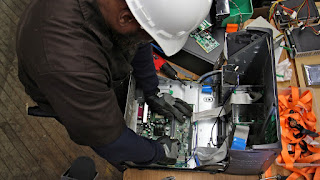Originally published at Entrepreneur.com
Having a criminal record can make it difficult to get hired, find a place to live and many other basic tasks. But can it stop you from starting your own business? The short answer is, no it can't stop you.
Former criminals can benefit from starting a business in several important ways:
- Self-direction. Rather than waiting for someone else to provide you with a job, you have the power to create something for yourself. It’s a challenge of your own making and one that can keep you focused and on the right track.
- Independence and freedom. Many people start a business because it provides them with independence and freedom. They can make their own decisions and set their own rules, rather than following someone else.
- Avoiding employment issues. Many ex-cons find it difficult to get hired because of their criminal past. But if you’re starting a business from scratch, you won’t have to go through the interview process; you’ll be working for yourself. Hello boss.
Key limitations
Of course, there are some issues and unique challenges faced by ex-cons attempting to start a business:
- Felons and certain positions. For starters, felons are sometimes limited in the types of positions they can hold. For example, you may not be able to create a business or establish a position for yourself in the legal or medical field. These restrictions are often in place to protect the public from potentially unscrupulous service providers. However, there are plenty of other options to choose from.
- Licensing and registry. Depending on the type of business you want to start, you may be required to get a license or permit to operate. Depending on the requirements, these documents may open the door to a personal background check. Your criminal record may make it more difficult to get the documentation and approvals you need to operate.
- Travel. Criminal records can also impact your ability to travel, interfering with your visa or visa waiver applications. If your business depends on your ability to travel to other countries, you may need to find someone else to handle those responsibilities.
- Funding. As an ex-con, you may also have trouble finding the funding you need to start your business. Banks that issue loans typically do background checks on borrowers. If you have a criminal history, you may have trouble getting approved for a loan. You may also encounter problems finding an angel investor or VC willing to contribute, based on your past.
- Partnerships. Similarly, you may find it harder than usual to find a partner willing to build a business with you. You may have to spend a long time looking for someone more open-minded, or you may have to go it alone.
Play to your strengths
If you’re starting a business as someone with a criminal record, there are actually a few things that can play out in your favor if you know how to take advantage of them. For starters, you may be able to qualify for a grant or education program specifically tailored to entrepreneurs with a criminal past. For example, the organization Inmates to Entrepreneurs exists to provide grants, resources, and other forms of assistance to former criminals who want to turn their lives around. And organizations like SCORE offer free business mentoring and education to a wide range of aspiring business owners, regardless of their background.
Conventionally, a criminal record is a “bad thing” for your reputation and public image. However, you may be able to spin it as a positive for the business. For example, if you advertise that this business is hiring former prisoners as a way to help them start a new life, you may attract more customers who want to patronize the business and support it as an organization. This is especially true if you reinvest a portion of your profits into criminal reform programs and other causes that help people with criminal records.
Additionally, there may be some experiences and skills acquired in prison that can help you become a better entrepreneur. For example, if you’re used to an environment that’s both harsh and highly competitive, you’ll be a more ruthless strategist as a leader. And if you’re used to the uncertainty and lack of safety netting in a prison environment, the stress and ambiguity of entrepreneurship may seem tame by comparison.
So is it possible for a former criminal to start a successful business? Yes, it is. Countless ex-cons have gone on to create successful businesses under their direction. There are several obstacles you’ll need to overcome to do this, and there’s certainly no guarantee of success, but by using the right strategies and compensating for your weaknesses, you can increase your likelihood of accomplishing your goals.
15 Businesses You Can Start For Cheap (or even FREE)
Companies hire felons | companies that hire felons | Companies that hire ex-offenders | Employers that hire ex-offenders | employers that hire felons | Jobs for felons | jobs for ex-offenders | jobs that hire felons | places that hire felons | felon friendly jobs | felon friendly employers | how to get a job with criminal record | second chance jobs for felons | temp agencies that hire felons | high paying jobs for felons | List of companies that Hire Felons
Can You Start a Business With a Criminal Record?















